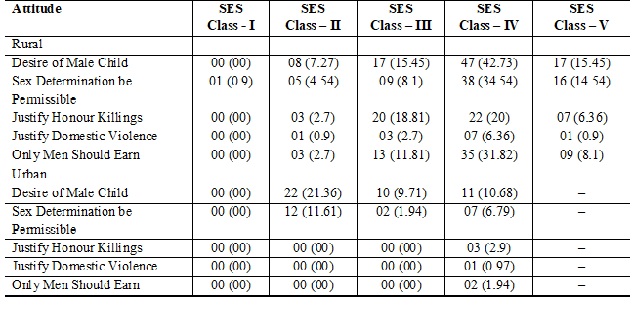To assess the knowledge attitude and practices regarding women empowerment and its impact on health status of women in rural and urban areas attached with Govt. Medical College, Patiala, Punjab
Abstract
Introduction: Women’s empowerment, or autonomy, is a multifaceted concept. In a patriarchal society, as exists in large parts of India, men are placed in a more advantageous position than women. The state of male supremacy is reflected in the child rearing and caring practices, the Access to nutrition, child care and education all favour boys over girls. Women’s empowerment is essentially an effort to rectify this imbalance and attain gender equity. The most common indicators for measuring empowerment measure capabilities, education and health in particular, and control over economic and political resources and decision-making.
Material and Methods:In this cross-sectional study, all married females from 200 households were interviewed in rural (CHC Bhadson) and urban (MCH Center Tripuri) field practice areas attached with department of Community Medicine, Government Medical College, Patiala (100 households each from rural and urban). Married females from age group of 18 – 49 years were included in this study. A pre-tested proforma was used to collect information of knowledge, attitude and practices (KAP) regarding women empowerment and their health status. The study was conducted between March 2011 to June 2012.
Results:After interviewing 110 women in rural and 103 in urban area, the data regarding socio demographic profile of the respondents and their knowledge, attitude and practices regarding various domains of empowerment and their health status was compiled and analysed statistically. Knowledge regarding legal age of marriage was higher in urban women (78.64%) as compared to rural women (43.64%). 64.08% urban and 49.09% rural women received treatment for anaemia during pregnancy. In the rural area 75% of children died were females. Majority (60.91% rural and 51.46% urban women) reported that they had experienced domestic violence.
Conclusion: From the information it can be concluded that the attitudes or opinions of the women in a family are definitely influenced by the better empowerment status of the women. It is evident that if the empowerment (education, occupation and financial status) of the reproductive age group of women is enhanced it will lead to better health status.
Recommendations:It is recommended that provision of education, employment and improving their socio economic status by the Government will lead to modification in the overall health scenario of the family, community, state as well as a country.
Downloads
References
2. Kirsten Stoebenau and AnjuMalhotra. The International Center for Research on Women (ICRW) Link between fertility declines and Women’s Empowerment could be Transformative, Nov. 2011.
3. World Health Organization (WHO)1999: Health and Development in the 20th Century. Geneva: WHO.
4. Commission on Status of Women.2009. Review of the implementation of the Beijing declaration and plan for action, the outcomes of the twenty third special session of the General Assembly and its contribution to shaping a gender perspective towards the full realization of millennium Development Goals.
5. Closing the gap in a generation: Health equity through action on the social determinants of health. WHO, Geneva. 2008.[pubmed]
6. National Family Health Survey (NFHS-3): Ministry of health and family welfare: 2003.
7. National Family Welfare statistics (NFWS): Ministry of health and family welfare: 2003, 2011.
8. National Family Health Survey (NFHS): Ministry of Health and Family Welfare : 2011
9. Vinitha, Saudan Singh And A.K. Rajendran.Level of Reproductive Health Awareness and Factors Affecting It In A Rural Community of South India C.T.Health and Population Perspectives and Issues 2007;30 (1) 24-44.
10. Sen Amartya. “More than 100 Million Women Are Missing”. The New York Review of Books 37.20 (1990). Web. 18 August 2011.
11. National Family Health Survey – 3: 2005-2006.
12. Dr.KathiaVanEgmond.KapSurveyRegarding Reproductive Health Ibnsina HEALTH Program For Afghanistan, AfghansitanICRH InternationalCentre For Reproductive Health, University Of Ghent, Belgium October 2002.[pubmed]
13. K.N. Agarwal, D.K.Agarwal,A.Sharma, K.Parsad, et al. Prevalence of anaemiain pregnant & lactating women in India Healthcare & Research Association for Adolescents Noida, Nutrition Foundation of India, New Delhi, India. Indian J Med RES 124, August 2006,pp173-184.
14. Masood Ali Shaikh, Irshad Ali Shaikh, Anila Kamal, Sobia Masood. Attitudes about honour killing among men and women —perspective from Islamabad.J Ayub Med Coll Abbottabad 2010;22(3) 38-49. http://www. Ayubmed.Edu.PK/Jamc/Past/22-3/Masood.Pdf
15. Nisha Srivastava, Ravi Srivastava Women Work and Employment Outcome in Rural India.Economic and Political Weekly. 2010;45 (28): 49-63.
16. Caren A. Grown & Chandrika Bahadur & Jessie Handbury& Diane Elson, 2006. "The Financial Requirements of Achieving Gender Equality and Women's Empowerment," Economics Working Paper Archive wp_467, Levy Economics Institute

Copyright (c) 2019 Author (s). Published by Siddharth Health Research and Social Welfare Society

This work is licensed under a Creative Commons Attribution 4.0 International License.


 OAI - Open Archives Initiative
OAI - Open Archives Initiative


